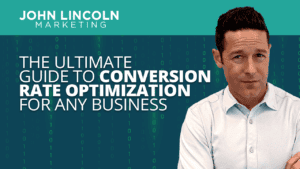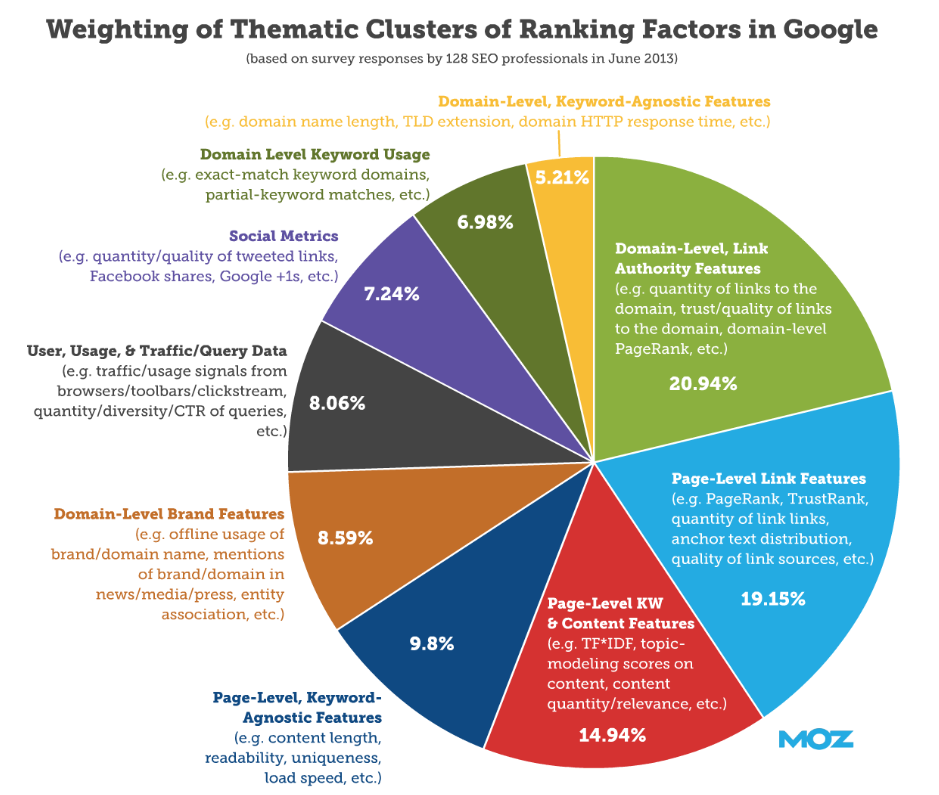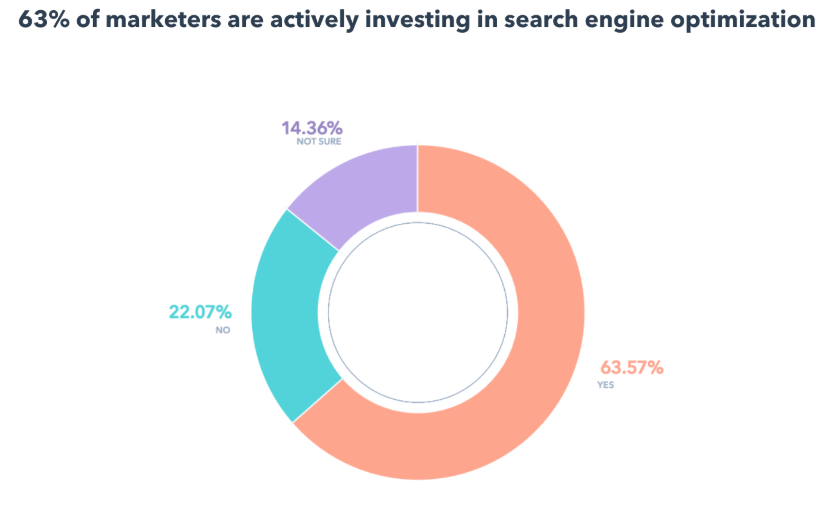
The Ultimate Guide to Conversion Rate Optimization for Any Business
Whether you’re a seasoned marketer or just starting out, conversion rate optimization (CRO) is a powerful tool that can boost your sales, leads, and overall
SEO is an eternally moving target.
Like many other forms of internet marketing, SEO best practices are always changing and developing. And these days, search engine algorithms are updated on a routine basis—roughly 500 to 600 times per year.
Whether it be driven by competition, enthusiasm, or pure curiosity, more and more businesses are starting to look into the possibilities that SEO has to offer their company.
As they begin exploring, one looming question begs an answer—How long does SEO take?
Before we delve into specific time frames, let’s first make sure you get off to a winning start and understand the basics of SEO.
While there’s plenty of misinformation still circulating about SEO, it’s arguably the most valuable marketing channel out there. Whether they’re small, medium, or large, every company that operates online needs SEO. Here’s the proof:
SEO is an acronym for “search engine optimization,” which is the ongoing process of increasing the visibility and ranking of a website or web page in the organic search engine results displayed in search engines like Google and Bing.
As you know, the goal of a search engine is to find, aggregate, and organize the internet’s content in order to provide the most relevant results to the questions users are asking.
In order to appear in those search results, your content needs to be visible to search engines. This is perhaps the most vital piece of the SEO puzzle because if searchers can’t find your site, there’s no way you’ll ever show up in the search engine results page.
A complex algorithm is used to determine how search engines pull up the results for any given search term or phrase. Though the exact algorithm is in a constant state of flux, there are many important principles of SEO that are evergreen.
When it comes to SEO, many marketers believe that your strategy depends heavily on the keywords you choose, but this isn’t entirely accurate.
For one, you should place just as much emphasis on keywords as you do the domain name. The domain is important because a domain name that’s easy to remember is going to receive more traffic than a domain that’s longer and more difficult to process. Users tend to trust a website that has an easier name.
In addition, a catchy, unique domain name can help boost your rankings since there is an increased potential to solidify brand recognition.
So, be sure to strive for domain names that are shorter, easier to commit to memory, easier to type, and easier to say. Because of search engine’s growing dependence on usability as a ranking factor, the easier a URL is to read, the better it is for search engines.

The location of your website and business can also be a major factor in SEO. Depending on the language of the country your website was launched in, it can affect your search engine rankings. If your company has a global reach, you may have a higher ranking if your website is available in multiple languages because you’ll attract more visitors.
The content of a website is also a major factor in SEO, with more than 72% of online marketers describing content marketing as “their most effective SEO tactic.” The accessibility of a website can affect SEO since it makes an impact on a user’s experience. When visitors are satisfied with the content on a site, you’re more likely to get repeat visitors, thereby giving your website a higher score.
One of the most important roles of Google is ensuring that the companies listed in their search results are legitimate businesses related to the search inquiries from their users.
So, before venturing too far down the rabbit hole, consider fixing any SEO errors you already have. Unreliable website hosting and other Google penalties may take a while to recover from.
Depending on the number of broken links, 301 redirects, and 404 errors your site has, resolving these errors can show positive results in as fast as two weeks.
But, be mindful that Google doesn’t index all these changes at the same time. You may see an increase quickly in some respects, but not in all.
This is a tricky question that doesn’t come with a cut-and-dry answer.
The problem in answering this kind of question is that there’s so much commotion in digital marketing that many businesses kick off their SEO strategy with unrealistic expectations.
Be mindful that Google alone uses more than 200 ranking factors, and every business has thousands of online competitors.

While there are sources that claim that an SEO campaign can produce quality results in 30 days, others claim it’s closer to 90 days. The reality is that the expected time depends on a variety of conditions.
There are some companies that have had an online presence for more than a decade, making them more credible and competitive in the space. With years of SEO practice under their belts, they’ve earned their ranking in Google.
However, if your website is relatively new and you’re trying to go after a term that thousands of businesses have been ranking for years, it’s somewhat impractical to assume that you can launch a site and get ranked for that term right away.
Even if they’ve never tried to optimize the website correctly for keywords, they may have plenty of links coupled with useful content, which creates what we call a “money site.” This is a website dedicated to advertisements, sponsored posts, or affiliate commissions, serving as the main web property that generates a significant portion of your online revenue.
But, if you’re going after niche terms or highly local terms, then that’s a different story. According to Google research, “50 percent of consumers who conducted a local search on their smartphone visited a store within a day, and 34 percent who searched on computer/tablet did the same.” In this case, you could be looking at ranking these types of terms between nine months and a year.
Keep in mind that each term has different levels of complexity. Its ranking can be based on how authoritative the domain using it is, how many links the domain has to the main homepage (and to the individual pages you’re trying to get ranked), how valuable the content is, and what the competition is doing to maintain their rankings.
Although there was a time when SEO was unfamiliar territory for most businesses, the businesses who knew about SEO didn’t place much importance on it. This lack of knowledge ended up paving the way for other businesses to move up the rankings quickly. That’s why it’s crucial that you remember that like you, your competition is investing heavily in SEO too.

To ensure you are optimizing your website correctly, you can hire an SEO company that will identify and integrate the right terms on each page.
As each individual section of the website is optimized, you’ll start to see more and more traffic go to the sections that are worked on over time. From there, expect a gradual increase in traffic, usually within three-to-five months.
By the end of the year, you should see traffic gains between 20 percent and 100 percent, depending on how big the service package is and how much and how hard your marketing team drove the initiative. For new sites, you’ll see some traffic come in, but no significant gains until you hit the nine-to-twelve-month mark.
To recap, SEO is a never-ending process that should continue as long as your website is up and running. It needs to be treated much like you would treat any other aspect of marketing.
For example, you wouldn’t just launch one email marketing campaign, avoid analyzing the open and click-through rates, and expect that it will achieve the desired result. Marketing is a constant cycle of gathering, strategizing, creating, measuring, fine-tuning, and repeating the cycle over again.
And, despite the several rounds of trial and error, you must go through to build a solid SEO strategy, it’s a must to succeed in today’s online marketplace. In fact, those who stick with it end up being some of the most prominent players online.
There are no shortcuts to make this happen faster if you want real, sustainable results.
Depending on the success of your keywords, current search trends, and the budget you have in place, the initial results take time to take effect. But like all good things, the results and in turn, increased revenue, will make it well worth the wait!
Welcome to John Lincoln’s personal website. On this website, we offer courses by John Lincoln, review software, publish articles and videos. You can also learn about John Lincoln’s books, films, book him to speak and contact him. John is directly associated with many of the businesses mentioned on this website and freely discloses this information.

John Lincoln is CEO of Ignite Visibility, one of the top digital marketing agencies in the nation. Ignite Visibility is a 4x Inc. 5,000 company. Ignite Visibility offers a unique digital marketing program tied directly to ROI with a focus on using SEO, social media, paid media, CRO, email, Amazon and PR to achieve results. Outside of Ignite Visibility, Lincoln is a frequent speaker and author of the books “Digital Influencer” and “The Forecaster Method.” Lincoln is consistently named one of the top digital marketers in the industry and was the recipient of the coveted Search Engine Land “Search Marketer of The Year” award. Lincoln has taught digital marketing and Web Analytics at the University of California San Diego since 2010, has been named as one of San Diego’s most admired CEO’s and a top business leader under 40. Lincoln has also made “SEO: The Movie” and “Social Media Marketing: The Movie.” His business mission is to help others through digital marketing.
Want to get in touch with John Lincoln? Click Here To Reach Out.

Whether you’re a seasoned marketer or just starting out, conversion rate optimization (CRO) is a powerful tool that can boost your sales, leads, and overall

Feeling overwhelmed by the sea of SEO companies out there? You’re not alone! Choosing the right partner is crucial for achieving your online marketing

In 2024, business blogging is not only still relevant – it’s a critical component of any content marketing strategy. Companies that blog generate 67% more
 How to Turn Costs Into Profit
How to Turn Costs Into Profit Cost centers are just one of those necessary evils associated with running a business. After all, it takes money to